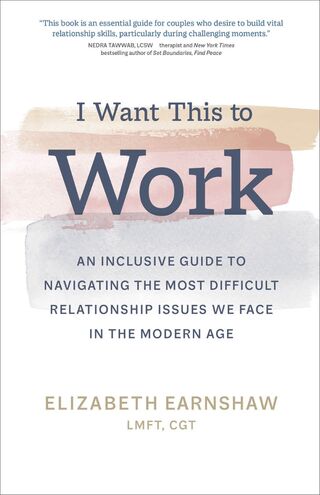Relationships
The Long-Term Relationship: I Want This to Work
The Book Brigade talks to marriage and family therapist Elizabeth Earnshaw
Posted December 2, 2021 Reviewed by Lybi Ma

Couples today want a lot from their closest relationships, including a sense of belonging and a source of purpose. In order to make their relationship work, however, they have to be able to communicate clearly about their expectations and about such mundane matters as how to share the tasks of life.
There are an awful lot of books about relationships. What makes your different?
A few things make my book different. First, it is inclusive of many types of couples. Unfortunately, most popular relationship books include only examples of hetero couples. Although much of the advice in such books can be applied to any couple, LGBTQ readers can wind up feeling left out and ignored.
Second, I often find myself wishing there were books that integrated all of the best relationship practices in one place. Right now, if you want to understand attachment theory and how it influences your relationship, you have to go to one book, and if you want to learn to have better communication skills you go to another book. And then, if you want to know how to set boundaries and practice good self-care in your relationships, you have to go to a third book. I have created a manual where you can find all of these things in one place.
What do partners most want from each other these days?
People are looking for relationships that provide daily life support but also the capacity to create meaning together. They are seeking belonging and purpose through their relationships.
.You say people must learn to make relationships work in a new way. What is that new way?
In the past, most couples followed a template in which one person, usually the male partner, was responsible for out-of-the-home work while the other partner, usually the female, was responsible for in-home work. Now, most couples are leading a life where they are sharing these tasks. Unfortunately, they are still following the same template.
This means that while they might want to share the distribution of work, they aren't actually. This often leads to one partner feeling overwhelmed and burnt out while the other partner is, unfortunately, unaware of the dilemma. In order to make their relationship work, they need to be willing to consciously communicate about roles and expectations, because those roles are not laid out as clearly as they might have been in the past.
Where should people start who want their relationship to work?
First, they both need to agree that there is a problem, and they have to have a willingness to solve it. Ideally, couples would start this work together. However, I always say, "Be the change you want to see in the relationship" and start by focusing on what you need to do differently within the relationship.
Is there some particular trap that many couples fall into?
Couples fall into conflict cycles, and they get very stuck in them. Over time, they start to feel hopeless and disconnected because they can't get out of the cycle. The most common is the blame game, where they spend more time pointing fingers at each other for all of life's woes than trying to work together to create a plan for making things better.
What do you think are the most important things people should look for in searching for a long-term mate?
Look for a person who is willing to take your feedback, hear out your boundaries, and have important conversations. And make sure that they are someone you have fun with and enjoy being around: It's the positive experiences that carry us through the hard times.
You talk a lot about honoring oneself in a relationship. What do you mean and why is it important?
Honoring yourself in the relationship means that you recognize that for the relationship to function well, you have to be treated well—by yourself and the other person. Honoring yourself means that you learn to take care of yourself in the relationship and that you expect the other person to accept your influence, care about your well-being, and respect you.
Given that interdependence is an important couples goal, what does healthy interdependence look like in a relationship?
The easiest way to think about healthy interdependence is to imagine a dance between connection and independence. Interdependent people are able to recognize themselves as separate from their partner. This means they have the capacity to speak up for their needs, take action on their goals, and offer their own opinions. However, they also have the capacity to be connected to their partner. This means that they make space for their partner to speak up for their needs, take action on their goals, and have their own opinions. Being able to hold onto oneself while also holding space for the other is the ultimate goal.
What do you find is the most difficult relationship problem to solve?
When couples come into therapy, they don't realize that it's not usually the problem they present that is the real problem. Whether you disagree on how to navigate in-laws, have differing levels of desire, or don't spend money the same way , it's not really the difference that matters. It's whether or not you can make space to hear each other's opinions as valid and work together to come up with creative solutions for creating win/win scenarios. In short, the most difficult problem to solve is when couples are stuck in a relationship that is about winning and losing.
Why do couples need to look back to move forward?
Couples need to look back in order to move forward because many of their current hang-ups are built upon past hurts, either in their individual histories or within the relationship itself. If I am still hurting from childhood and unaware of how that hurt plays out with my partner, I will be bound to continue to repeat the same patterns. Or if I still blame my partner or feel betrayed by my partner for some past indiscretion, then it's unlikely I will offer the flexibility needed to move forward in the relationship. Learning to understand and, if possible, repair past wounds allows us to open back up to vulnerability, creativity, and flexibility with our partner.
What kinds of boundaries do couples need to set up in relationships?
We need two types of boundaries. We need internal boundaries, which are the boundaries we have with ourselves—for example, I know I need rest, so even if my partner gets home at midnight, I am going to take myself to bed anyway. And we need external boundaries; these are the types of boundaries we have with our partners. For example, saying something like "Hey, Honey, I know you're getting in late tonight. I really need to sleep. When you come in the bedroom, please don't turn on the TV).
What is the single most important message you want people to get out of your book?
I want people to know that they can change their relationships if they are both willing to do the work of taking responsibility for themselves and taking responsibility for the relationship. Beautiful and healthy relationships are built in the crossroads of independence and dependence, and we've all got work to do to better balance those.
About THE AUTHOR SPEAKS: Selected authors, in their own words, reveal the story behind the story. Authors are featured thanks to promotional placement by their publishing houses.
To purchase this book, visit: I Want This to Work





